
The Wicker Man is a 1973 British folk horror film directed by Robin Hardy and starring Edward Woodward, Britt Ekland, Diane Cilento, Ingrid Pitt and Christopher Lee. The screenplay is by Anthony Shaffer, inspired by David Pinner's 1967 novel Ritual, and Paul Giovanni composed the film score.
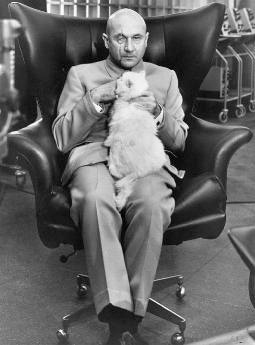
Ernst Stavro Blofeld is a fictional villain in the James Bond series of novels and films, created by Ian Fleming. A criminal mastermind with aspirations of world domination, he is the archenemy of British MI6 agent James Bond. Blofeld is head of the global criminal organisation SPECTRE and is commonly referred to by the codename Number 1 within this organisation. The character was originally written by Fleming as a physically massive and powerfully built man, standing around 6' 3" and weighing 20 st, who had become flabby with a huge belly.
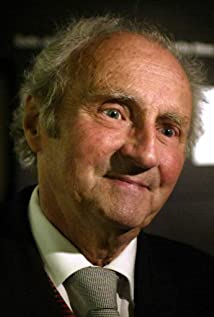
André Albert Auguste Delvaux was a Belgian film director. He co-founded the film school INSAS in 1962 and is regarded as the founder of the Belgian national cinema. Adapting works by writers such as Johan Daisne, Julien Gracq and Marguerite Yourcenar, he received international attention for directing magic realist films.

The mullet is a hairstyle in which the hair is cut shorter at the front, top and sides, but is longer at the back.

A bob cut, also known as a bob, is a short to medium length haircut for women, in which the hair is typically cut straight around the head at approximately jaw level, and no longer than shoulder-length, often with a fringe at the front. The standard bob cut exposes the back of the neck and keeps all of the hair well above the shoulders.

"Rapunzel" is a German fairy tale most notably recorded by the Brothers Grimm and published in 1812 as part of Children's and Household Tales. The Brothers Grimm's story was developed from the French literary fairy tale of Persinette by Charlotte-Rose de Caumont de La Force (1698), which itself is an alternative version of the Italian fairy tale Petrosinella by Giambattista Basile (1634).
Captain Future is a pulp science fiction hero – a space-traveling scientist and adventurer – originally published in the United States in his his namesake pulp magazine from 1940 to 1944. The character was created by editors Mort Weisinger and Leo Margulies. The majority of the stories were authored by Edmond Hamilton. A number of adaptations and derivative works followed.

Julien Duvivier was a French film director and screenwriter. He was prominent in French cinema in the years 1930–1960. Amongst his most original films, chiefly notable are La Bandera, Pépé le Moko, Little World of Don Camillo, Panic (Panique), Deadlier Than the Male and Marianne de ma jeunesse.

Densha Otoko is a Japanese movie, television series, manga, novel, and other media, all based on the purportedly true story of a 23-year-old otaku who intervened when a drunk man started to harass several women on a train. The otaku ultimately began dating one of the women.
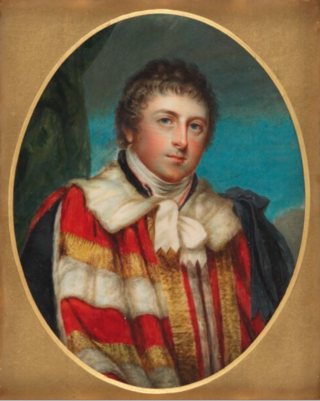
An eponymous hairstyle is a particular hairstyle that has become fashionable during a certain period of time through its association with a prominent individual.

Disney Fairies is a Disney franchise created in 2005. The franchise is built around the character of Tinker Bell from Disney's 1953 animated film Peter Pan, subsequently adopted as a mascot for the company. In addition to the fictional fairy character created by J. M. Barrie, the franchise introduces many new characters and expands substantially upon the limited information the author gave about the fairies and their home of Never Land. The characters are referred to within stories as "Never Land fairies." The franchise includes children's books and other merchandise, a website and the animated Tinker Bell film series, featuring the character and several of the Disney fairies as supporting and recurring characters.
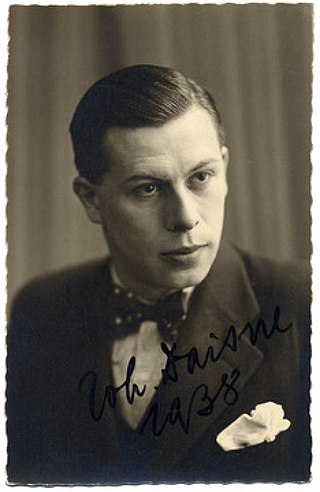
Johan Daisne was the pseudonym of Flemish author Herman Thiery. Born in Ghent, Belgium, he attended the Koninklijk Atheneum before studying Economics and Slavic languages at Ghent University, receiving his doctorate in 1936. In 1945 he was appointed chief librarian of the city of Ghent.

Long hair is a hairstyle where the head hair is allowed to grow to a considerable length. Exactly what constitutes long hair can change from culture to culture, or even within cultures. For example, a woman with chin-length hair in some cultures may be said to have short hair, while a man with the same length of hair in some of the same cultures would be said to have long hair.
A pixie cut is a short hairstyle, generally short on the back and sides of the head and slightly longer on the top, with very short bangs. It is a variant of a crop. The name is derived from the mythological pixie.
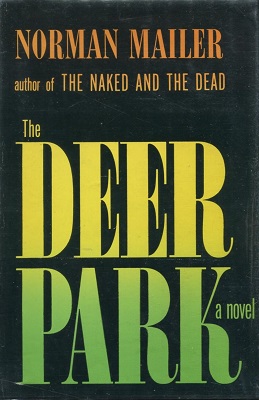
The Deer Park is a Hollywood novel written by Norman Mailer and published in 1955 by G.P. Putnam's Sons after it was rejected by Mailer's publisher, Rinehart & Company, for obscenity. Despite having already typeset the book, Rinehart claimed that the manuscript's obscenity voided its contract with Mailer. Mailer retained his cousin, the attorney Charles Rembar, who became a noted defense attorney for publishers involved in censorship trials.

African-American hair or Black hair refers to hair types, textures, and styles that are linked to African-American culture, often drawing inspiration from African hair culture. It plays a major role in the identity and politics of Black culture in the United States and across the diaspora. African-American hair often has a kinky hairy texture, appearing tightly coiled and packed. Black hair has a complex history, culture, and cultural impact, including its relationship with racism.

The Mystic Archives of Dantalian is a Japanese light novel series written by Gakuto Mikumo and illustrated by G-Yuusuke. The series started serialization in Kadokawa Shoten's light novel magazine The Sneaker on February 29, 2008. A manga adaptation by Chako Abeno started serialization in Kadokawa Shoten's shōnen manga magazine Shōnen Ace on March 26, 2010. Another manga adaptation by Monaco Sena started serialization in Kadokawa Shoten's seinen manga magazine Comp Ace on March 26, 2010. A 12-episode anime adaptation by Gainax aired between July and October, 2011.

Ken Liu is an American author of science fiction and fantasy. Liu has won multiple Hugo and Nebula Awards for his novel translations and original short fiction, which has appeared in F&SF, Asimov's, Analog, Lightspeed, Clarkesworld, and multiple "Year's Best" anthologies.
The Man Who Had His Hair Cut Short is a 1966 Belgian drama film directed by André Delvaux, starring Senne Rouffaer and Beata Tyszkiewicz. It tells the story of a schoolteacher who falls in love with one of his students, and moves away in order to escape his infatuation. The film is based on the 1947 novel with the same title by Johan Daisne.
Secular laws regulating hairstyles exist in various countries and institutions.
















